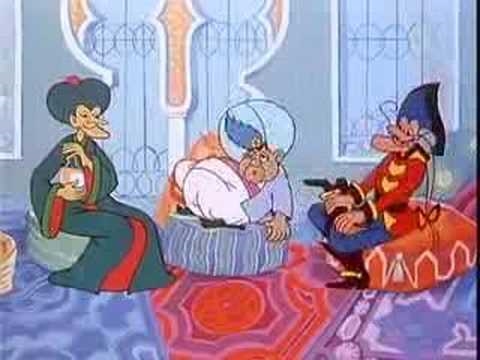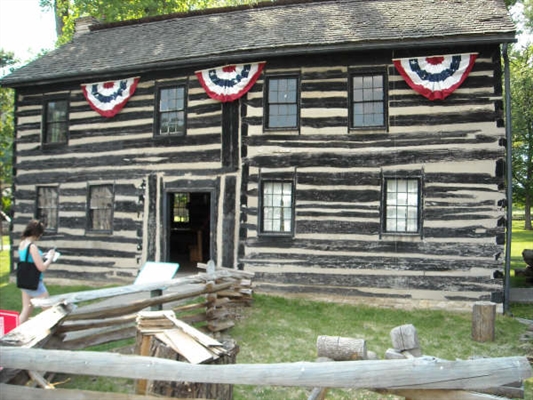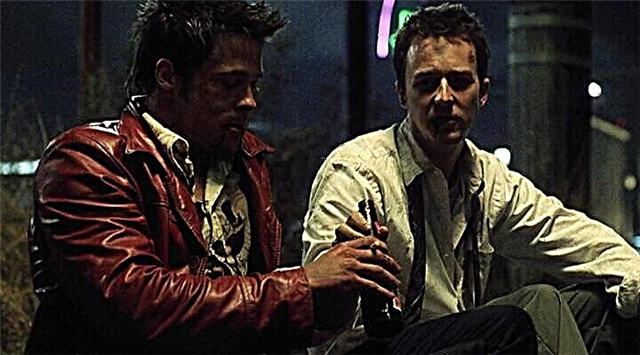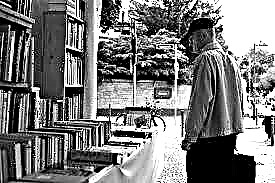Vanya - the son of Darya Rumyantseva - was killed at the front in the 42nd year, and paper with a seal and an incomprehensible but painfully suspicious signature (one hook with an eyelet) comes in more than a year later. And Daria decides that the paper is fake, forged by some unkind person.
When gypsies pass through the village, Daria goes to fortune-tell to Vanya every time. And every time the cards are scattered as well as possible. It turns out - he is alive. And Daria patiently waits for the end of the war.
By night, in the winter and in the fall, she leaves for the stable to watch the horses and there everything is thinking about Ivan’s son. Comes back at dawn, dragging along a path some scrap, an abandoned peg or a rotten gorge - you won’t live without firewood in the winter. She drowns a log hut every other day, and invents potatoes to cook in a samovar: it’s both easier and more profitable, and boiling water for drinking seems to be something more convenient.
Daria has not yet come of age, and they take the full tax from her: eggs, meat, wool, potatoes. And she had already surrendered everything, having bought something, sometimes replacing one with another, and only arrears were listed for her and the entire tax was monitored, not to mention insurance, a loan and self-tax. Under these articles, she and the last forty-second year has not been paid. And here Pashka Neustupov, nicknamed Kuverik, who was not taken to Vanin’s army for health due to his health, brings Daria new obligations. And it requires "to settle with the state."
The famine among the people begins somehow imperceptibly, little by little, and no one throws up his hands when the first old woman dies of exhaustion on the collective farm. And now the doors almost do not close from the great abundance of the poor. Soon, there is absolutely nothing to eat. Women go to a distant, still a grain collective farm - to change clothes for grain and potatoes. Daria has a good half-woolen Ivanov costume. Ivan bought it three weeks before the war, did not even have time to vilify it. When Daria becomes unbearable and her heart begins to hurt, she takes the costume out of the sennik and catches the distant smell, already clogged by the mustiness of the chest. Once, turning his pockets out, he sees a penny and shaggy pollen and then sits for a long time, excited, with lightening tears. And hides a penny in a sugar bowl.
On May First, the rural grandfather, the gray cove Misha, buys her only remaining living creature - a goat. Daria takes half the price with money (and then gives it to the fingent), half with potatoes. And he also divides the potatoes in half: a basket for food, a basket for seeds. But in order not to die, you have to cook this seed potato in a samovar. Finally, Daria decides: she goes with the women, exchanges a suit for half a potato, and planted one and a half ridges with scraps. And the basket of the remaining cut potatoes eats up to Kazan itself.
Summer is coming. Every day Daria walks with women to mow, and on huts heats swollen feet in the sun. She is always drawn to sleep, dizzy and subtly, carbon monoxide rings in her ears. At home, Daria speaks with a samovar, as she previously spoke with a goat or with an underground mouse (the mouse does not live in her hut now).
And suddenly Pasha Kuverik comes to Daria again and demands to pay money. You alone, he says, mischief in the whole village. Pashka does not intend to wait any longer: apparently, he will have to take measures. Busily looking around the hut, he begins to describe the property, then takes away what he finds valuable - two pounds of wool and a samovar. Daria, crying, begs to leave her a samovar: "I will pray for God for you, Pashenka," but Kuveri does not want to listen.
Without a samovar in a hut, it becomes completely unpleasant and empty. Daria cries, but the tears in her eyes also end. She gnaws at a soft, overgrown potato in the ground, another one. Lying on the stove, Daria is trying to separate reality from sleep and can not. Distant thunders seem to her the noise of a wide, two-lane war. The war is presented to Daria in the form of two endless rows of soldiers with guns, and these soldiers alternately shoot at each other. And Ivan is at a loss, and for some reason he does not have a gun. Daria painfully wants to shout at him so that he quickly takes a gun, but screaming does not work. She runs to her son, but her legs do not obey and something heavy, omnipotent prevents her. And the ranks of soldiers farther and farther ...
On the third or fourth day, Surganikha sees a samovar on display in the store Daryin. "This demon Kuverik," thinks Surganikha, "took the samovar from the old woman." On the mowing, she talks about the samovar to the women, it turns out that Daria has not been entering the field for the third day. Women from all over the village collect as much as they can and, having bought the samovar, are satisfied, they go to Darya’s hut, but only the mistress is not in it. “It can be seen, sincere, that she has left the world,” says Surganikha.
During the summer, hundreds of beggars go through the village: old people, children, old women. But no one saw Daria, and she does not return home. And only in winter does the rumor reach the village that some dead old woman was found about ten kilometers from here, in a hayloft in a forest wasteland. The pieces in her basket were already dry, and her clothes were summer. The women unanimously decide that this is necessarily theirs Daria. But old Misha only makes fun of the women: “Are there really few such old women from Mother Rasea? If you count these old women, duck, go, and Digital isn’t enough. ”
Or maybe they are right, these women, who knows? They women are almost always right, especially when there is such a war on earth ...




 Wow! Projects
Wow! Projects






